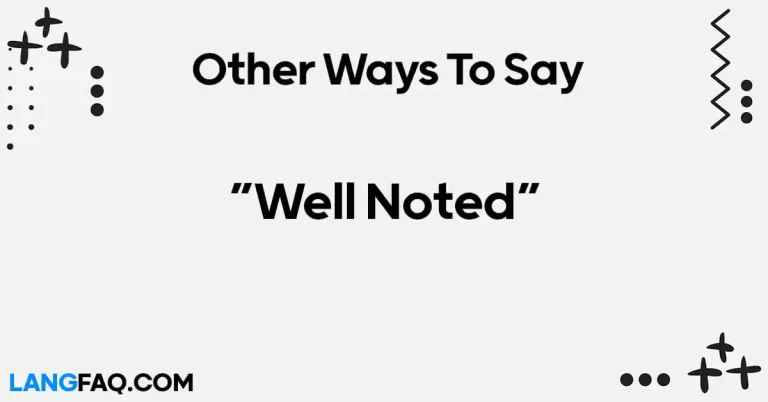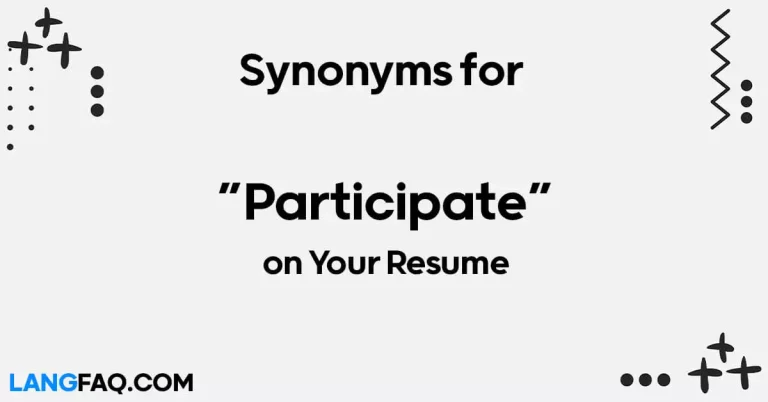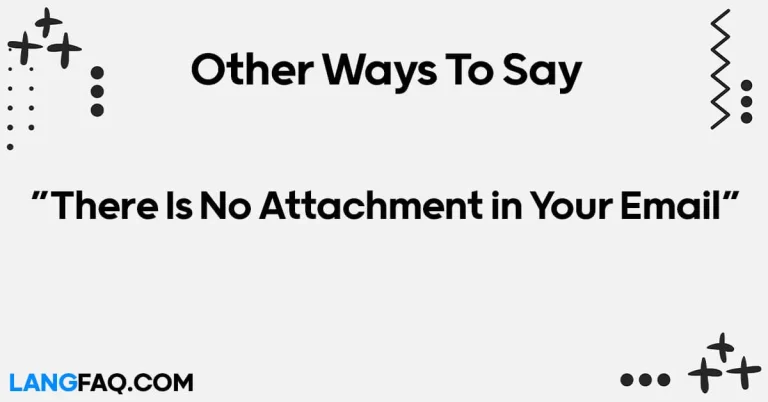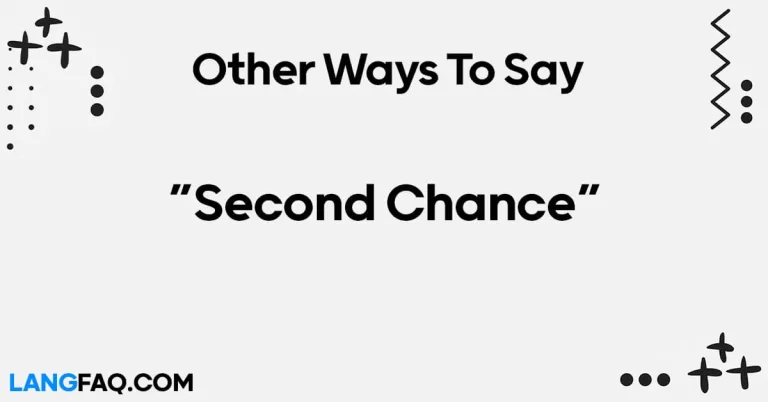Embarking on a quest for success often involves seeking guidance. In the pursuit of knowledge, the question, “Does It Work for You?” echoes. However, there are manifold ways to phrase this inquiry, each unveiling unique perspectives. In this comprehensive guide, we explore 12 distinct ways to pose this question, delving into the nuances and depth of each.
12 Other Ways to Ask “Does It Work for You?”
Here are 12 other ways to ask “Does It Work for You?”:
- How effective has this been for you?
- Can you share your experience with its functionality?
- In your opinion, does this deliver the desired results?
- Have you found success using this approach?
- Is this method yielding the outcomes you anticipated?
- Could you describe the impact this has had on your situation?
- Do you feel satisfied with the results of using this?
- Has this proven to be a suitable solution for your needs?
- Can you attest to the efficacy of this strategy?
- In your experience, does this measure up to expectations?
- Would you say this approach is producing the desired effects?
- How well does this align with your objectives and goals?
Here’s a table with meanings and examples for the 12 different ways to ask “Does It Work for You?”:
| Question | Meaning | Example |
|---|---|---|
| How effective has this been for you? | Inquiring about the overall success or usefulness of something. | “Can you share how effective this method has been for you?” |
| Can you share your experience with its functionality? | Seeking insights into personal experiences with a specific functionality. | “I’d love to hear about your experience with its functionality.” |
| In your opinion, does this deliver the desired results? | Asking for a subjective evaluation of whether the expected outcomes are achieved. | “Do you think this approach delivers the results you were hoping for?” |
| Have you found success using this approach? | Seeking confirmation of successful outcomes through a particular method. | “Have you found success using this specific approach?” |
| Is this method yielding the outcomes you anticipated? | Checking if the results align with the expectations. | “Are the outcomes in line with what you initially anticipated?” |
| Could you describe the impact this has had on your situation? | Requesting a detailed account of the influence or effect on a given situation. | “Could you share how this has impacted your current situation?” |
| Do you feel satisfied with the results of using this? | Evaluating personal satisfaction regarding the achieved results. | “Are you satisfied with the results you’ve experienced using this method?” |
| Has this proven to be a suitable solution for your needs? | Assessing if the method adequately meets specific requirements or needs. | “Has this proven to be a suitable solution for your current needs?” |
| Can you attest to the efficacy of this strategy? | Requesting a formal statement affirming the effectiveness of a particular strategy. | “Can you attest to the efficacy of this strategy in achieving your goals?” |
| In your experience, does this measure up to expectations? | Seeking a comparative evaluation between actual outcomes and initial expectations. | “In your experience, does this measure up to the expectations you had?” |
| Would you say this approach is producing the desired effects? | Confirming if the chosen approach is yielding the intended or desired effects. | “Would you say this approach is producing the desired effects for you?” |
| How well does this align with your objectives and goals? | Evaluating how closely the method aligns with the set objectives and goals. | “How well does this align with your current objectives and goals?” |
Asking “Does It Work for You?” can take on various forms, each providing a nuanced perspective on the effectiveness of a method or approach. By tailoring your inquiry to specific aspects, you can gain a more comprehensive understanding of its impact from different angles.
Is It Correct to Say “Does It Work for You?”?
Yes, “Does It Work for You?” is a grammatically correct and commonly used phrase. It is a straightforward and polite way to inquire about the effectiveness or suitability of something for an individual. The phrase is often employed in various contexts, including professional settings, personal interactions, and discussions about products or strategies.
Example Scenarios:
- Professional Setting:
- Manager: “We’re implementing a new workflow. Does it work for you in terms of efficiency and productivity?”
- Product Evaluation:
- Customer: “I’ve recommended this software. Does it work for you in managing your tasks effectively?”
- Personal Context:
- Friend: “I’ve started a new workout routine. Does it work for you, or do you prefer a different approach to staying fit?”
The phrase is versatile and can be adapted to various situations. It seeks feedback without assuming a positive or negative response, making it suitable for open-ended discussions. Additionally, it maintains a neutral tone, making it appropriate for both formal and informal conversations.
Grammar Insight: The phrase follows the standard structure of an interrogative sentence, beginning with the auxiliary verb “Does,” followed by the subject “It,” and ending with the main verb “Work” and the prepositional phrase “for you.”
Usage Tips:
- Use it when seeking feedback on a specific approach, method, or solution.
- Maintain a friendly and open tone to encourage honest responses.
- Adapt the question based on the context, making it more specific if necessary.
In conclusion, “Does It Work for You?” is grammatically correct, widely accepted, and serves as an effective way to inquire about the practicality or success of a given situation or solution.
Professional Mail Example With “Does It Work for You?”
Subject: Seeking Your Feedback: New Project Management Tool Implementation
Dear [Recipient’s Name],
I trust this email finds you well. As part of our ongoing efforts to enhance efficiency and collaboration within the team, we have recently implemented a new project management tool.
We understand that adapting to new tools can be a significant adjustment, and your experience and insights are crucial to ensuring a smooth transition. Therefore, we would greatly appreciate it if you could take a moment to share your thoughts on how the new project management tool is working for you.
Specifically, does it work for you in terms of streamlining your workflow and facilitating better communication among team members? Your feedback will not only help us fine-tune the implementation but also ensure that the tool aligns with your work objectives.
Feel free to highlight any aspects that are particularly effective or areas where you believe improvements could be made. Your candid feedback is invaluable to us as we strive to create an environment that supports your professional success.
If you have any concerns or suggestions, please don’t hesitate to share them. We are committed to making adjustments based on your input to enhance the overall user experience.
Thank you in advance for your time and collaboration. We look forward to hearing your thoughts on how the new project management tool aligns with your work processes and objectives.
Best regards,
[Your Full Name] [Your Position] [Your Contact Information]
1. How effective has this been for you?
Definition:
This question seeks an assessment of the overall success or efficiency of a particular method, strategy, or approach.
Scenario and Examples:
In a professional context, you might use this phrase when discussing project methodologies or business strategies. For instance: Colleague: “How effective has the new project management tool been for you?” Mentor-Mentee: “As you explore different coding techniques, how effective has this approach been in optimizing your code?”
Dictionary Insight:
According to the Cambridge Dictionary, “effective” refers to producing the intended results or having a particular effect.
Tips and Usage:
- Use this phrase in a formal setting to inquire about the practical outcomes of a specific method.
- It’s versatile and can be applied in various professional scenarios, from project management to personal development strategies.
Email Sample:
Subject: Seeking Your Feedback on the New Sales Strategy
Body: Dear [Recipient],
I trust this email finds you well. I would appreciate it if you could share your insights on how effective the new sales strategy has been for you. Your feedback is invaluable as we aim to continuously refine our approaches.
Best regards, [Your Name]
2. Can you share your experience with its functionality?
Definition:
This question aims to delve into personal experiences related to the practical use and features of a system, tool, or method.
Scenario and Examples:
In a tech-related context, you might ask a colleague or a friend about their experience with a software tool: Colleague: “Can you share your experience with its functionality, especially in handling large datasets?” Friend: “I’m considering a fitness app. Can you share your experience with its functionality, like tracking workouts and setting goals?”
Dictionary Insight:
“Functionality” refers to the quality of being practical and suitable for the purpose it was designed for.
Tips and Usage:
- Suitable for both professional and personal contexts, especially when discussing tools, apps, or systems.
- Use it to seek insights into the practical aspects and user-friendliness of a product or method.
Email Sample:
Subject: Seeking Your Insights on XYZ Software’s Functionality
Body: Dear [Recipient],
I hope this email finds you in good spirits. I’m in the process of evaluating XYZ Software and would greatly appreciate it if you could share your experience with its functionality. Your insights will greatly assist me in making an informed decision.
Thank you in advance for your time.
Best regards, [Your Name]
3. In your opinion, does this deliver the desired results?
Definition:
This question invites a subjective evaluation of whether a specific approach or method aligns with the anticipated or desired outcomes.
Scenario and Examples:
In a business setting, you might use this phrase when discussing marketing strategies: Colleague: “In your opinion, does this marketing campaign deliver the desired results?” Supervisor-Subordinate: “Considering your experience, does this training program deliver the desired results for our team?”
Dictionary Insight:
“Opinion” refers to a belief or judgment that is not necessarily based on facts but on personal feelings or experiences.
Tips and Usage:
- Useful in scenarios where subjective perspectives are valuable, such as marketing, creative projects, or team management.
- Encourages open communication by acknowledging the subjective nature of the inquiry.
Email Sample:
Subject: Seeking Your Opinion on the Recent Marketing Campaign
Body: Dear [Recipient],
I hope this message finds you well. We are currently evaluating the recent marketing campaign, and I would greatly value your opinion on whether it delivers the desired results. Your insights will contribute significantly to our analysis.
Thank you for your time and expertise.
Best regards, [Your Name]
4. Have you found success using this approach?
Definition:
This question seeks confirmation of successful outcomes achieved through a particular method, strategy, or approach.
Scenario and Examples:
In a career development context, you might ask a mentor about their success with a particular networking approach: Mentor-Mentee: “Have you found success using this networking approach, especially in building professional connections?” Colleague: “Considering your experience, have you found success using this negotiation strategy in client interactions?”
Dictionary Insight:
“Success” refers to the accomplishment of an aim or purpose.
Tips and Usage:
- Appropriate for both professional and personal contexts, particularly when discussing strategies or approaches.
- Positively framed, encouraging the sharing of successful experiences.
Email Sample:
Subject: Inquiry Regarding Your Success with XYZ Networking Approach
Body: Dear [Recipient],
I trust this email finds you well. I’m currently exploring different networking approaches, and given your expertise in the field, I’m curious to know if you have found success using the XYZ approach. Your insights would be immensely valuable.
Thank you for considering my inquiry.
Best regards, [Your Name]
5. Is this method yielding the outcomes you anticipated?
Definition:
This question assesses whether the actual results align with the expectations set for a particular method or strategy.
Scenario and Examples:
In a project management context, you might inquire about the effectiveness of a new methodology: Colleague: “Is this method yielding the outcomes you anticipated in terms of project efficiency?” Supervisor-Subordinate: “Considering your expertise, is this negotiation strategy yielding the outcomes you anticipated in client interactions?”
Dictionary Insight:
“Yield” in this context means to produce or provide.
Tips and Usage:
- Appropriate in professional scenarios, particularly when evaluating the performance of a method.
- Encourages a reflection on expectations versus actual outcomes.
Email Sample:
Subject: Inquiry Regarding Anticipated Outcomes of the New Project Methodology
Body: Dear [Recipient],
I hope this email finds you well. As we implement the new project methodology, I’m curious to know if it is yielding the outcomes you anticipated in terms of project efficiency. Your insights will greatly contribute to our ongoing assessments.
Thank you for your time and expertise.
Best regards, [Your Name]
6. Could you describe the impact this has had on your situation?
Definition:
This question aims to prompt a detailed account of the influence or effect a particular method or situation has had on an individual or a specific context.
Scenario and Examples:
In a personal development context, you might ask a friend about the impact of a mindfulness practice: Friend: “Could you describe the impact mindfulness has had on your daily life and stress levels?” Mentor-Mentee: “Considering your experiences, could you describe the impact adopting a growth mindset has had on your career?”
Dictionary Insight:
“Impact” refers to the powerful effect that something has, often in terms of influence or consequence.
Tips and Usage:
- Suitable for both personal and professional contexts, particularly when exploring the effects of a method or practice.
- Encourages a detailed narrative, providing a richer understanding of the situation.
Email Sample:
Subject: Seeking Insights into the Impact of Mindfulness Practice
Body: Dear [Recipient],
I trust this email finds you in good health. I’m currently exploring mindfulness practices, and I would greatly appreciate it if you could describe the impact it has had on your daily life and stress levels. Your personal insights will be instrumental in guiding my journey.
Thank you for considering my inquiry.
Best regards, [Your Name]
7. Do you feel satisfied with the results of using this?
Definition:
This question evaluates personal satisfaction regarding the achieved results through a specific method, strategy, or approach.
Scenario and Examples:
In a product review context, you might inquire about a friend’s satisfaction with a new fitness app: Friend: “Do you feel satisfied with the results you’ve achieved using this fitness app?” Colleague: “Considering your experiences, do you feel satisfied with the results of implementing this project management approach?”
Dictionary Insight:
“Satisfied” means contented or pleased with a situation or outcome.
Tips and Usage:
- Appropriate for both professional and personal contexts, particularly when discussing the impact of a method.
- Encourages a reflection on personal contentment with the achieved results.
Email Sample:
Subject: Seeking Your Satisfaction Insights on XYZ Project Management Approach
Body: Dear [Recipient],
I hope this message finds you well. As we assess the effectiveness of the XYZ project management approach, I’m curious to know if you feel satisfied with the results achieved. Your insights will contribute significantly to our ongoing evaluations.
Thank you for your time and expertise.
Best regards, [Your Name]
8. Has this proven to be a suitable solution for your needs?
Definition:
This question assesses whether a particular method, strategy, or approach has been effective in meeting specific requirements or needs.
Scenario and Examples:
In a software selection context, you might ask a colleague about the suitability of a specific tool: Colleague: “Has this software proven to be a suitable solution for your programming needs?” Mentor-Mentee: “Considering your experiences, has this mentoring approach proven to be a suitable solution for career guidance?”
Dictionary Insight:
“Suitable” means right or appropriate for a particular purpose or person.
Tips and Usage:
- Appropriate for both professional and personal contexts, particularly when evaluating the appropriateness of a solution.
- Encourages a reflection on the alignment between the method and specific needs.
Email Sample:
Subject: Seeking Your Evaluation on the Suitability of XYZ Software
Body: Dear [Recipient],
I trust this email finds you well. We are currently assessing different software options, and I’m curious to know if XYZ Software has proven to be a suitable solution for your programming needs. Your insights will significantly inform our decision-making process.
Thank you for considering my inquiry.
Best regards, [Your Name]
9. Can you attest to the efficacy of this strategy?
Definition:
This question requests a formal statement affirming the effectiveness of a particular strategy, method, or approach.
Scenario and Examples:
In a business strategy discussion, you might ask a mentor for their formal affirmation: Mentor-Mentee: “Can you attest to the efficacy of this negotiation strategy in client interactions?” Colleague: “Considering your expertise, can you attest to the efficacy of this marketing approach in reaching our target audience?”
Dictionary Insight:
“Efficacy” refers to the ability to produce a desired or intended result.
Tips and Usage:
- Suitable for professional contexts, particularly when seeking a formal endorsement of a strategy.
- Positively framed, indicating a request for a confident affirmation.
Email Sample:
Subject: Seeking Your Endorsement on the Efficacy of XYZ Marketing Approach
Body: Dear [Recipient],
I hope this email finds you well. We are currently evaluating our marketing approach, and I would greatly appreciate it if you could attest to the efficacy of the XYZ strategy. Your formal endorsement will greatly enhance our confidence in its effectiveness.
Thank you for your time and expertise.
Best regards, [Your Name]
10. In your experience, does this measure up to expectations?
Definition:
This question prompts a comparative evaluation between actual outcomes and initial expectations regarding a particular method, strategy, or approach.
Scenario and Examples:
In a project evaluation, you might ask a colleague about their experience with a new workflow: Colleague: “In your experience, does this measure up to expectations in terms of project efficiency?” Supervisor-Subordinate: “Considering your expertise, does this measure up to expectations in client interactions with our new communication protocol?”
Dictionary Insight:
“Measure up to” means to be as good as expected or required.
Tips and Usage:
- Appropriate for professional contexts, particularly when evaluating the performance of a method.
- Encourages a reflection on whether the actual outcomes meet the anticipated expectations.
Email Sample:
Subject: Seeking Your Evaluation on Whether XYZ Workflow Measures Up to Expectations
Body: Dear [Recipient],
I trust this email finds you well. As we assess the performance of the XYZ workflow, I’m curious to know, in your experience, does it measure up to expectations in terms of project efficiency? Your insights will significantly contribute to our evaluation process.
Thank you for considering my inquiry.
Best regards, [Your Name]
11. Would you say this approach is producing the desired effects?
Definition:
This question inquires whether a specific approach or method is generating the intended or desired effects.
Scenario and Examples:
In a leadership development context, you might ask a mentor about the effectiveness of a coaching approach: Mentor-Mentee: “Would you say this coaching approach is producing the desired effects in team leadership?” Colleague: “Considering your experiences, would you say this approach is producing the desired effects in client interactions?”
Dictionary Insight:
“Desired effects” refer to the outcomes or results that are intended or wished for.
Tips and Usage:
- Suitable for professional contexts, particularly when assessing the impact of a specific approach.
- Positively framed, indicating a consideration of whether the effects align with expectations.
Email Sample:
Subject: Seeking Your Assessment on Whether XYZ Approach Produces Desired Effects
Body: Dear [Recipient],
I hope this message finds you well. We are currently evaluating our leadership development approach, and I would greatly value your insights on whether the XYZ approach is producing the desired effects in team leadership. Your expertise in this matter is highly regarded.
Thank you for your time and consideration.
Best regards, [Your Name]
12. How well does this align with your objectives and goals?
Definition:
This question assesses the alignment between a particular method, strategy, or approach and the specific objectives and goals of an individual or a situation.
Scenario and Examples:
In a career development discussion, you might ask a mentor about the alignment of a professional development plan: Mentor-Mentee: “How well does this professional development plan align with your career objectives and goals?” Colleague: “Considering your experiences, how well does this strategy align with the objectives and goals of our project?”
Dictionary Insight:
“Align” means to arrange or position in a straight line, but in this context, it refers to the harmonious agreement or compatibility between elements.
Tips and Usage:
- Appropriate for both professional and personal contexts, particularly when evaluating the suitability of a method.
- Encourages a reflection on whether the method contributes to the achievement of specific objectives and goals.
Email Sample:
Subject: Seeking Input on Alignment with Goals
Hi [Recipient’s Name],
Hope this message finds you well. As we’re shaping our strategies for the upcoming quarter, I’d appreciate your insights on how well you think the proposed changes align with our shared objectives. Looking forward to hearing your thoughts!
FAQs
How do benchmarks contribute to success?
Benchmarks serve as guideposts, allowing individuals to measure progress and adjust strategies accordingly. They provide a clear path toward achieving and surpassing goals.
Why is celebrating achievements important?
Celebrating achievements acknowledges the effort and dedication invested in the journey. It fosters motivation, creating a positive cycle of continuous improvement.
How can setbacks be turned into opportunities for growth?
Setbacks offer valuable lessons. Embracing setbacks as opportunities for growth involves learning from challenges, adapting strategies, and using adversity as a catalyst for improvement.
What role does teamwork play in personal success?
Teamwork amplifies individual strengths and fosters a collaborative environment. Success becomes a shared journey, with each member contributing to the collective achievement.
Why is curiosity crucial for success?
Curiosity fuels exploration and innovation. It prompts individuals to seek new solutions, learn from experiences, and continually evolve on their path to success.
How does reflecting on personal growth contribute to success?
Reflection enhances self-awareness and understanding. Recognizing areas of personal growth allows individuals to refine their strategies, setting the stage for continued success.
Conclusion:
Embarking on the quest of success involves not just reaching destinations but navigating a dynamic journey. By exploring the 12 ways to ask “Does It Work for You?” differently, we uncover the richness of individual experiences and strategies. Success is a nuanced tapestry woven with milestones, celebrations, challenges, and continuous self-discovery. Pose your questions with intention, and let the diverse inquiries guide you on your path to success.







